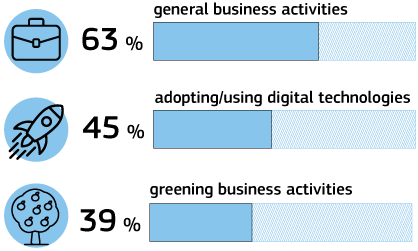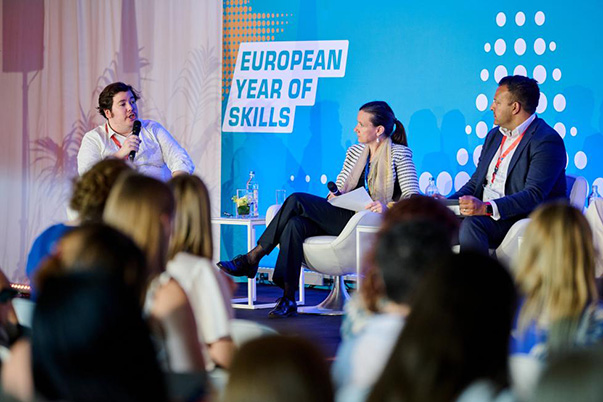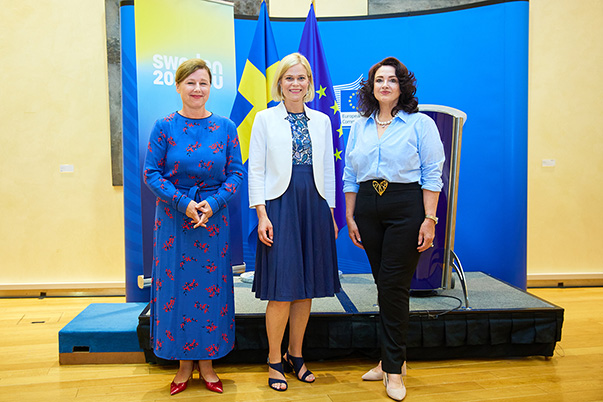
Chapter 6 – Building a fair and social Europe

Introduction
The EU’s efforts to ensure that the economic recovery from the pandemic and the green and digital transitions are socially just and fair intensified further in 2023. With hundreds of events and activities throughout the year, the European Year of Skills provided strong impetus for greater participation in lifelong learning and for developing skills and attracting talent to boost the EU’s competitiveness. The EU also stepped up its groundbreaking work on ensuring gender equality, including by adopting measures to ensure equal pay for equal work and acceding to the Istanbul Convention on Preventing and Combating Violence against Women and Domestic Violence.
A fair economy for the green and digital transitions
With its core principles of equal opportunities and access to the labour market, fair working conditions, and social protection and inclusion, the European Pillar of Social Rights - open a new tab. acts as the EU’s guide to making Europe’s societies fairer and more resilient. It aims to ensure that everyone has equal chances in life and can benefit from the same social rights. These range from good education and training throughout life, fair wages and benefits, and safe and healthy working conditions to childcare, pensions and affordable, good-quality healthcare.
2023 marked the second anniversary of the action plan to turn the pillar into reality. Almost all of its 75 measures have now been implemented or presented. A review of the action plan is set for 2025.
The 2023 ‘Joint Employment Report - PDF file, open a new tab.’ was the first to provide an update on progress towards the EU and national employment, skills and social-protection targets set for 2030. While the EU is well on track towards its headline employment target of 78 % by 2030, significant progress is still needed to reach the targets on adult learning and poverty reduction.
At least 78 % of the population aged 20 to 64 should be in employment by 2030
At least 60 % of all adults should participate in training every year by 2030
The number of people at risk of poverty or social exclusion should decrease by at least 15 million by 2030
Strengthening social dialogue and the social economy
Negotiations between organisations representing employers and workers through social dialogue help improve living and working conditions, and also play an important role in adapting to changing economic and social circumstances. However, the degree of involvement of social partners varies considerably among EU Member States, while newer forms of employment and certain groups, such as young people, are less likely to be represented.
To support the Member States in strengthening social dialogue, the EU adopted a recommendation - open a new tab. with concrete measures for the greater involvement of social partners – for example, promoting collective bargaining and consulting them when designing and implementing economic, employment and social policies. Social partners were also consulted - open a new tab. on action to strengthen the rights of European Works Councils - open a new tab., which are an important tool for involving workers in decisions that may affect their employment or working conditions made by companies operating in several Member States.
The social economy in numbers
The social economy prioritises people and social and environmental causes over profit. Social-economy organisations span a diverse range of sectors, from social and care services to housing, recreation and affordable energy. They include cooperatives, mutuals, non-profit associations, foundations and social enterprises.
More than
13
million
paid jobs
2.8
million
social-economy entities in the EU
The social economy accounts for
6.3 %
of EU employment
Social economy organisations play a crucial role in tackling societal challenges and promote fair working conditions by involving employees in decision-making and governance. They also create opportunities for under-represented groups, such as women and young people, and contribute to making the green and digital transitions fair and inclusive. To support the further development of this important sector, the EU approved measures - open a new tab. in November to create an environment that enables social economy organisations to thrive and grow. A new one-stop shop - open a new tab. for the social economy provides information on EU funding, training opportunities and what is happening on the ground in the Member States.
Today, non-profit associations engaging in activities in another Member State face different rules across the EU, resulting in administrative burdens and costs. To remove these obstacles, the European Commission has proposed - open a new tab. a new national form of non-profit association specifically designed for cross-border activities, which will allow them to enjoy their Single Market freedoms.

The Just Transition Fund - open a new tab. and the European Globalisation Adjustment Fund - open a new tab. are key to ensuring that no one is left behind. In addition, the newly created Social Climate Fund - open a new tab. will support vulnerable EU households, micro businesses and transport users, who may face energy and transport poverty. Around €65 billion of the fund’s €86.7 billion budget will come from revenue generated by the new EU Emissions Trading System - open a new tab. covering the building and transport sectors. It will operate from 2026 until 2032. (See also Chapter 4.)
Boosting competitiveness and skills
While the green and digital transitions are opening up new opportunities for people and the European economy, many EU companies are reporting difficulties in finding workers with the skills they need. To deliver the necessary reskilling and upskilling of the European workforce and attract people with the right skills to the EU, 2023 was designated the European Year of Skills - open a new tab..
The urgency for such an initiative was highlighted by the results of a survey - open a new tab. carried out in spring among small and medium-sized enterprises, which revealed results that could limit the EU’s capacity to achieve its goals.

Skills shortages are holding
SMEs back in relation to:

Skills shortages by job role
Percentage of SMEs facing skills
in relation to:

Initiatives such as the Pact for Skills - open a new tab. are already tackling challenges and shortages in skills development, and will make an important contribution to the Year of Skills. So far, more than 2 million people have benefited from upskilling and reskilling activities, and more than 1 500 organisations have signed up to the Pact for Skills Charter - open a new tab., including 20 large-scale partnerships - open a new tab.. Pact members have also developed or updated more than 15 000 training programmes and invested close to €160 million in skills initiatives.
Modelled on the European Battery Academy - open a new tab., launched in 2022, the Commission is proposing Net-Zero Industry Academies to equip workers with the necessary skills for the green transition. The academies, each focusing on one net-zero technology, will bring together industry, social partners, and education and training providers.

The European Year of Skills
The European Year of Skills aims to get everyone to recognise the importance of training and to become active.
The EU is working with Member States, social partners, employment services, chambers of commerce and industry, education and training providers, workers and companies to step up and advance skills development on the ground.

The flagship Making Skills Count - open a new tab. event brought together around 300 people in Brussels and more than 1 000 online. The European Vocational Skills Week - open a new tab. from 23 to 27 October highlighted the importance of vocational education and training in responding to economic, climate and social challenges. By the end of the year, more than 900 events had been organised at the national and local levels.
As one of the flagship initiatives of the European Year of Skills, the New European Bauhaus initiative launched the NEB Academy - open a new tab. on skills for sustainable construction. It will accelerate upskilling and reskilling in the construction ecosystem to support the transition towards a regenerative bioeconomy - open a new tab.. This is where renewable biological resources from the land and sea (e.g. crops, forests and fish) are used to produce food, materials and energy. Identifying knowledge gaps in the use of bio-based materials and digital technologies will be among the first areas of the academy’s focus, along with increased circularity in construction.
As an important contribution to the Year of Skills, the Commission consulted social partners on an initiative to update and strengthen the European Quality Framework for Traineeships - open a new tab.. The framework aims to improve the quality of traineeships, particularly in terms of learning and training content and working conditions, in order to ease the transition from education, unemployment or inactivity and allow people to enhance their skills and gain work experience.
The EU-wide Innovation Talent Platform - open a new tab., launched in March, will help businesses, including start-ups, find the talent they need beyond the EU. This will increase the mobility of skilled individuals towards and within Europe through international recruitment and by supporting matchmaking between EU-based employers and qualified nationals of non-EU countries who want to move legally to and work in the EU.

In the coming years, the EU’s population will continue to decline. If left unaddressed, demographic change will further exacerbate labour shortages and increase pressure on public budgets, as confirmed in the 2023 demography report - open a new tab.. Following a call by leaders at the European Council in June, the Commission presented a toolbox of measures - open a new tab. to help Member States manage demographic change. It aims to empower all generations to realise their personal aspirations and full potential in the economy and society at large.
Nurturing talent is particularly important in regions suffering from a shrinking labour force and a low proportion of people with a post-secondary education, and those hit by the departure of young people. The Talent Booster Mechanism - open a new tab. was launched in January 2023 as part of the EU’s strategy for harnessing talent in its regions - open a new tab.. It will support EU regions affected by the accelerated decline of their working-age population in training, retaining and attracting the people, skills and competences needed to address the impact of the demographic transition. The Harnessing Talent Platform - open a new tab. was officially launched in November, bringing together policymakers from regions and Member States with those at the EU level.
A toolbox of measures to manage demographic change

Parents
Facilitating the reconciliation of work and private life and the realisation of family plans.

Youth
Enabling young people to realise their potential in a high-quality learning environment and facilitate the transition to working life.

Older people
Supporting healthy and active ageing and enabling people to stay in control of their lives and still contribute to the economy and society.

Migration
Attracting and integrating talent from outside of the EU.
Promoting economic prosperity and well-being in all regions with place-based policies.
The implementation of the long-term vision for the EU’s rural areas - open a new tab. is in full swing. Over 2 000 organisations and authorities at the EU, national, regional and local levels are now collaborating to forge stronger cooperation across different policy areas and boost the sustainability and vitality of rural areas. 2023 saw the creation of the Rural Pact Coordination Group - open a new tab. and the launch of the Rural Pact Community Platform - open a new tab., with resources for rural communities facing population loss, ageing and demographic decline. The EU also provided political guidance - open a new tab. aimed at further strengthening the prosperity, resilience and social fabric of rural areas and rural communities.
In November, the Commission presented measures - open a new tab. to make the EU more attractive to talent from outside, and to make mobility within it easier. One of the core initiatives is a proposal to establish an EU Talent Pool. This will be the first EU-wide job-matching platform, aiming to facilitate international recruitment for occupations with shortages, at all skill levels. A set of recommendations accompanying the initiative will simplify and speed up the recognition of skills and qualifications acquired outside the EU. By providing clear and transparent online information and guidance on immigration and recognition procedures, the EU Talent Pool will support employers and jobseekers in navigating the complex recruitment rules. It will make international recruitment easier, faster and more effective for all concerned. The EU Talent Pool will also help implement Talent Partnerships by providing a tool for effective job placements for participating non-EU nationals.
Support for workers
Improving conditions for platform workers
The European Parliament and the Council advanced in their negotiations on the proposed directive on improving the working conditions in platform work. The proposal aims to ensure that people working through digital labour platforms are granted the legal employment status that corresponds to their actual work arrangements, and that they can enjoy the labour rights and social benefits they are entitled to. The directive also establishes new rules governing the use of automated systems in monitoring and decision-making on digital labour platforms. This promotes greater transparency and accountability in algorithmic management, empowering people to be aware of and challenge decisions affecting their working conditions.
How many platform workers are there?

The infographic indicates that, as of 2022, there were 28.3 million digital platform workers in the EU, a number comparable to the 29 million people employed in manufacturing. It is anticipated that, by 2025, the number of digital platform workers will surge by 52 %, reaching 43 million.
Peer learning for public administrations
In 2023, some 100 civil servants from 17 Member States took part in a new exchange project to prepare the next generation of policymakers in the EU. The Public Administration Cooperation and Exchange - open a new tab. programme enables participants to learn from the working methods and cultures of other EU public administrations. It is financed under the Technical Support Instrument - open a new tab., the EU programme that provides tailor-made technical expertise to Member States to help them design and implement reforms.
Digital skills for health professionals
During the year, Estonia, Spain, Italy and Romania benefited from projects funded by the Technical Support Instrument to strengthen the digital competences of their healthcare professionals and ensure constant upskilling in the future. The projects support health authorities at the national and regional levels in developing digital skills plans and operational guidelines to facilitate the adoption and use of electronic health records.

Health and safety at work
In November, the Parliament and the Council provisionally agreed - open a new tab. to lower the exposure limits for lead to a fifth of the current limit value. Lead can affect sexual function and fertility, and can harm the development of a foetus or the offspring of women exposed to it. They also supported the introduction of the first-ever exposure limit for chemicals called diisocyanates, which can cause respiratory diseases such as asthma. These changes, following a Commission proposal - open a new tab. based on the latest scientific evidence, will be key in protecting workers in the transition to climate neutrality. Both lead and diisocyanates are likely to be used, for example, in the production of batteries, in processes to make electric vehicles lighter, in wind turbines or as insulating materials during building renovations.
The EU amended legislation - open a new tab. to significantly lower the occupational exposure limit for asbestos - open a new tab.. This marks an important step towards better protection of workers from asbestos, a highly dangerous, cancer-causing substance that is still present in many buildings. It is part of the EU’s comprehensive approach to better protecting people and the environment from asbestos and ensuring an asbestos-free future.
Making life easier with digital social security coordination
Practical steps were proposed - open a new tab. to further digitalise the coordination of social security systems in Europe. Making full use of digital tools will improve the exchange of information between national social security institutions and speed up the recognition and granting of eligible benefits across borders. This will make it easier for EU residents to live, work and travel abroad, for companies to do business in other Member States and for national administrations to coordinate social security across borders (see Chapter 5).
Education, training and lifelong learning
Erasmus+
With almost 14 million participants to date, Erasmus+ - open a new tab. is one of the most emblematic EU programmes, covering education, training, youth and sport. The Commission increased the 2023 budget for the programme to a total of €4.43 billion – its highest-ever annual financial allocation. This helped reinforce the Erasmus+ priorities on inclusion, active citizenship and democratic participation, and on the green and digital transitions in the EU and internationally. The revised work programme included €100 million to support learners and educational staff affected by Russia’s war of aggression against Ukraine. The international dimension of Erasmus+ was strengthened, with a budget increase of €31 million to reinforce mobility projects and capacity building in higher education in support of international cooperation projects. In 2023, this also supported the creation of an open-education digital environment for students enrolled in Ukrainian higher education institutions, for those fleeing from Ukraine or for internally displaced students.
What was the profile of the average Erasmus+ higher education student in 2023?

The infographic depicts the average profile of an Erasmus+ student in 2023, who was 22.5 years old, typically spent 5.18 months abroad and received an average monthly grant of €374, with a gender distribution of 61% women and 39% men.
The European Education Area
The European Education Area - open a new tab. is an initiative to help Member States work together to build more-inclusive and more-resilient education and training systems. It aims to improve access to quality education and training, enable learners to move easily between education systems in different countries and help create a culture of lifelong learning. At the midterm point in building the European Education Area, the Council acknowledged the progress made - open a new tab. and the need for continued efforts by Member States, the Commission and a wider stakeholder community to make it a reality by 2025.

A dedicated Citizens’ Panel on Learning Mobility - open a new tab. (see also Chapter 9) generated 21 specific recommendations aimed at improving learning opportunities abroad for everyone in the EU. These were taken into account in the drafting of the Commission’s proposal for a Council recommendation - open a new tab. inviting Member States to make learning mobility within the EU an integral part of all education and training pathways.
Digital education
Digital skills are essential for people to participate in society and work, and for achieving social inclusion. The EU aims to improve the way people learn online and ensure that everyone has the digital skills they need, today and for the future.
With this in mind, in November the EU adopted two recommendations - open a new tab. that aim to guide and support Member States in developing the people’s digital skills and addressing the digital divide. The recommendations are part of the implementation of the 2021–2027 Digital Education Action Plan - open a new tab.. In parallel, work on the 13 actions under the plan continues. For example, in June, a community of practice was launched to support the European Exchange Platform for higher education content and educational data, as part of the Digital Education Hub - open a new tab.. The Commission has also started a pilot project to explore the development of a European Digital Skills Certificate - open a new tab., which would help people have their digital skills quickly and easily recognised across borders by employers and training providers. (For more information on digital skills, see Chapter 5.)

More-inclusive education systems
Thanks to the Technical Support Instrument, Spain, Italy and Portugal are making their education systems more inclusive for disadvantaged pupils through a multi-country project aimed at combating regional disparities. Funding under the instrument is also helping Ireland and Finland to develop roadmaps for upskilling teachers and promote quality and inclusive education, and supporting Romania in setting up and implementing a system to reduce the number of early school leavers.
Promoting books and reading
The first-ever Day of European Authors – a new initiative under the Creative Europe programme – was launched in March. Featuring over 1 000 events, it aimed to reconnect the younger generation with book reading and encourage people to discover the cultural and linguistic diversity of European literature.

Supporting research
Taking research and innovation as their starting point, five EU missions - open a new tab., supported primarily by Horizon Europe - open a new tab. funding, are helping the Commission’s work on the European Green Deal, on making Europe fit for the digital age and on Europe’s Beating Cancer Plan. Each mission sets out ambitious, practical and measurable targets to deliver tangible outcomes for everyone in the EU. A progress assessment shows - open a new tab. that the missions are on track to meet their ambitious goals by 2030.
To create a real and lasting impact, the missions mobilise a wide range of public and private actors – from Member States and regional and local authorities to research institutes, farmers, investors and associated partners from outside the EU. They also engage with citizens to boost the uptake of new solutions and approaches. In 2023, the preparatory phase was launched for a sixth mission on the New European Bauhaus. With a focus on innovation, this will aim to transform neighbourhoods across Europe for the better, making them beautiful, sustainable and inclusive by 2035.

As part of the Horizon Europe programme, the European Research Council - open a new tab. helps to push the boundaries of knowledge across all fields of science and scholarship through its prestigious grant schemes. Grants from the council worth a total of €2 billion were awarded in 2023 to projects that were selected based on their scientific excellence.
The Marie Skłodowska-Curie Actions - open a new tab. are the EU’s flagship funding programme for doctoral education and the postdoctoral training of researchers. Throughout 2023, the programme supported almost 3 000 projects and 4 400 organisations, which were selected for funding in 2021 and 2022. The funding, amounting to over €1.6 billion, will train more than 15 000 doctoral candidates within and outside academia.

Two EU-funded researchers were named as winners of the 2023 Nobel Prize in Physics - open a new tab.. Ferenc Krausz and Anne L’Huillier have received grants worth almost €9.5 million from the European Research Council. They have also received support from other EU research programmes, including the Marie Skłodowska-Curie Actions. They won the prize, together with fellow physicist Pierre Agostini, ‘for experimental methods that generate attosecond pulses of light for the study of electron dynamics in matter’.

In July, the Commission proposed - open a new tab. a Council recommendation to establish a new European framework for research careers, a new charter for researchers and a European competence framework for researchers. The main goal of these initiatives is to retain researchers in Europe, make it an attractive destination for researchers from outside and promote research careers as an attractive option for young students and graduates.
The first winners of a new prize recognising academic and research organisations for driving the change towards gender equality in research and innovation were announced on International Women’s Day (8 March). Three academic institutions from Ireland and one from Sweden took home the EU Award for Gender Equality Champions - open a new tab..
Stepping up measures for a Union of equality
Gender equality
Even though the right to equal pay for equal work or work of equal value is one of the founding principles of the EU, women in the EU earn on average around 13 % less than men. While the gender pay gap - open a new tab. is a complex issue, pay discrimination is considered a key contributory factor. New rules - open a new tab. on pay transparency aim to strengthen the application of the right to equal pay and help close the gender pay gap. The Pay Transparency Directive - open a new tab. gives workers the right to information on average pay levels for all those performing the same job or work of equal value, enabling workers to identify and challenge any pay discrimination based on sex.
The directive also gives workers the possibility to enforce their right to equal pay if they believe they are being discriminated against. For example, it will ensure that victims of pay discrimination can be represented in court by relevant associations and bodies, such as equality bodies. It ensures better compensation for victims and stronger penalties for the infringement of rights. The new rules must be incorporated into national law by 7 June 2026.
The Commission continued its support for action to prevent and combat gender-based violence and violence against children - open a new tab. through its Citizenship, Equality, Rights and Values programme - open a new tab.. Thirteen projects were selected to receive funding of almost €30 million. Seven of the selected proposals focus on gender-based violence and domestic violence, five target violence against children and one covers both adults and children.

The EU’s accession to the Istanbul Convention - open a new tab. on Preventing and Combating Violence against Women and Domestic Violence in June was an important milestone. It demonstrates the EU’s commitment to stepping up action against gender-based violence across the 27 Member States, and action in support of all victims of violence against women and domestic violence. The convention entered into force in the EU on 1 October 2023.

Gender stereotypes are a root cause of gender inequalities. The ‘#EndGenderStereotypes - open a new tab.’ campaign, launched in March, targets gender stereotypes that affect both men and women across all aspects of life, including work–life balance, career choices and opportunities for leadership positions. It aims to raise awareness about stereotypes in real-life situations and encourage people to question and address discriminatory practices.
Implementing the 2020–2025 LGBTIQ Equality Strategy
The 2023 Progress report on the implementation of the LGBTIQ Equality Strategy 2020–2025 - open a new tab. presents numerous lesbian, gay, bisexual, trans, intersex and queer (LGBTIQ)-related measures and shows that the majority of actions under the strategy have either been delivered or are being implemented. The report will inform discussions on what remains to be done for the successful implementation of the LGBTIQ Equality Strategy by 2025.
The Commission increased its funding under the Citizenship, Equality, Rights and Values programme to combat discrimination against LGBTIQ people and promote LGBTIQ equality, with €3 million allocated to projects specifically benefiting the LGBTIQ community in 2023–2024.
The ‘Keep Your Eyes Open - open a new tab.’ campaign was launched by the Commission in 2023 as an initiative under the 2020–2025 EU Strategy on Victims’ Rights - open a new tab. to raise awareness about the rights of victims of crime, including victims of anti-LGBTIQ hate crime. The campaign aims to encourage the friends and families of victims to offer help and support. The end goal is to ensure that the victims understand their rights and feel empowered to use them to seek justice.

Promoting inclusion and diversity
Winners of the 2023 European Capitals of Inclusion and Diversity Awards
The annual European Capitals of Inclusion and Diversity Awards - open a new tab. are part of the EU’s work - open a new tab. on combating racism and discrimination. The 2023 winners - open a new tab., spread across seven Member States, were celebrated for their work on building fairer societies by promoting diversity and inclusion in terms of gender, sexual orientation, racial and ethnic origin, religion and belief, ability and age.
How well does your employer/organisation manage diversity?
The EU Diversity Self-Assessment Tool - open a new tab., published in May during European Diversity Month - open a new tab., allows employers in the public and private sectors and organisations both big and small to see how well they manage diversity across six categories.
Organisational
diversity
infrastructure

Recruitment

Career
progression

Terms and
conditions

Recognition of
specific needs

Organisational
profile

Roma people are Europe’s largest ethnic minority. Many Roma continue to experience discrimination and social exclusion. In January, the Commission issued a stocktaking report - open a new tab. of national Roma strategies, assessed them against the commitments made by the Member States and provided guidance on areas that require improvement or more-significant effort. The Commission called on Member States to make the best use of EU funding instruments and to review their national frameworks to make them follow the Council Recommendation - open a new tab. on Roma equality, inclusion and participation more closely.
In late 2023, there was a marked increase in hate speech and hate crime in Europe, particularly towards Jewish and Muslim communities. In December, the Commission published a communication titled ‘No place for hate: A Europe united against hatred - open a new tab.’, which brought together EU measures on the subject. This drew on key existing work strands, including the EU Strategy on Combating Antisemitism and Fostering Jewish Life - open a new tab., and served as a call to action to all Europeans to stand up against hatred and speak up for tolerance and respect (see also Chapter 7).
2021–2030 Strategy for the Rights of Persons with Disabilities
A Union of equality can only be achieved when persons with disabilities enjoy their rights and can participate fully in society and the economy, like everyone else.
To ensure that persons with disabilities can enjoy equal access to benefits from discounts and other advantages across the EU, and can move freely between Member States, the Commission has proposed - open a new tab.:
- a new European Disability Card; and
- an improved European parking card for persons with disabilities.

The proposed European Disability Card aims to serve as recognised proof of disability across all Member States. It will grant cardholders equal access to the same special conditions and preferential treatment (e.g. free entry, reduced tariffs and priority access) granted to residents of the Member State they are visiting. This will apply to public transport, cultural events, museums, sports centres, etc. The card will complement existing national disability cards. The public consultation on the new card was made available through a number of alternative formats to ensure accessibility. As a result, more than 2 500 persons with disabilities contributed - open a new tab. to the initiative.
The proposed new parking card will guarantee the same rights to use parking spaces and facilities reserved for persons with disabilities as residents in the Member State concerned. It is intended to replace national parking cards.
The initiative is being negotiated by the Parliament and the Council.
Consumer protection
In 2023, the Commission, in collaboration with the authorities responsible for enforcing EU consumer protection laws (in the Consumer Protection Cooperation Networks - open a new tab.), continued to make significant strides in protecting consumers from unfair practices. Addressing the travel sector, the network played a crucial role in ensuring that consumers are treated fairly in the event of flight cancellations. In another significant development, Google engaged in a dialogue with the network in which it committed - open a new tab. to giving consumers clearer and more accurate information to comply with EU rules.
Modernised rules will ensure that only safe products are offered to EU consumers, regardless of their origin and whether they are sold in traditional shops or online marketplaces. The new rules - open a new tab., which address the challenges of increasing digitalisation, new technological developments and globalised supply chains, entered into force in June and will apply in all Member States as of 13 December 2024.
New rules to protect consumers - open a new tab. applying for credit (e.g. a loan to pay for a car) came into force in November. They aim to ensure that consumers know exactly what they are signing up for and that information is adapted to digital devices.
In addition, modernised rules on financial services contracts concluded at a distance - open a new tab. (e.g. online or by post) entered into force in December. The legislation sets out clear rules concerning the information that needs to be provided to consumers before the conclusion of a contract. It also introduces the possibility for the consumer to withdraw from a contract through an easy-to-find ‘withdrawal button’ on the seller’s website. The new rules, which will apply from the middle of 2026, also provide consumers with the possibility to contact a person in cases where a chatbot is not satisfactory.

Major travel agencies have committed to:

better informing consumers of their rights in case of flight cancellations;

expediting ticket refunds, with a maximum waiting time of 14 days for the consumer (a maximum of 7 days for airlines to refund travellers or the intermediary used to book the ticket and 7 days for the intermediary to process the reimbursement);

offering transparent contact details;

providing information on the specific benefits linked to their service packages;

explaining the implications of specific services on consumer rights in the case of flight disruptions.











